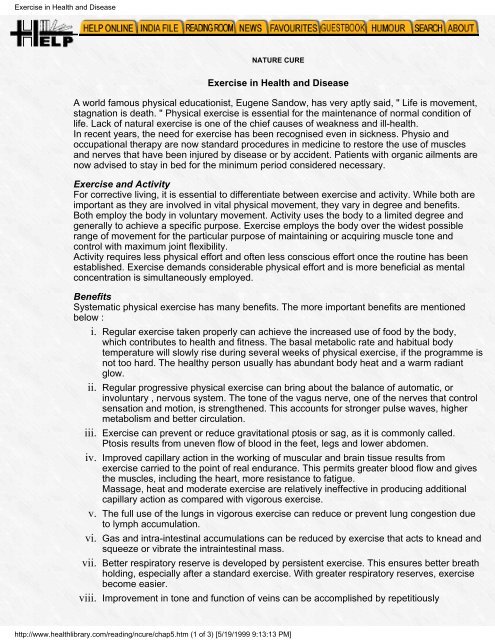A_Complete_Handbook_of_Nature_Cures
A_Complete_Handbook_of_Nature_Cures
A_Complete_Handbook_of_Nature_Cures
Create successful ePaper yourself
Turn your PDF publications into a flip-book with our unique Google optimized e-Paper software.
Exercise in Health and Disease<br />
NATURE CURE<br />
Exercise in Health and Disease<br />
A world famous physical educationist, Eugene Sandow, has very aptly said, " Life is movement,<br />
stagnation is death. " Physical exercise is essential for the maintenance <strong>of</strong> normal condition <strong>of</strong><br />
life. Lack <strong>of</strong> natural exercise is one <strong>of</strong> the chief causes <strong>of</strong> weakness and ill-health.<br />
In recent years, the need for exercise has been recognised even in sickness. Physio and<br />
occupational therapy are now standard procedures in medicine to restore the use <strong>of</strong> muscles<br />
and nerves that have been injured by disease or by accident. Patients with organic ailments are<br />
now advised to stay in bed for the minimum period considered necessary.<br />
Exercise and Activity<br />
For corrective living, it is essential to differentiate between exercise and activity. While both are<br />
important as they are involved in vital physical movement, they vary in degree and benefits.<br />
Both employ the body in voluntary movement. Activity uses the body to a limited degree and<br />
generally to achieve a specific purpose. Exercise employs the body over the widest possible<br />
range <strong>of</strong> movement for the particular purpose <strong>of</strong> maintaining or acquiring muscle tone and<br />
control with maximum joint flexibility.<br />
Activity requires less physical effort and <strong>of</strong>ten less conscious effort once the routine has been<br />
established. Exercise demands considerable physical effort and is more beneficial as mental<br />
concentration is simultaneously employed.<br />
Benefits<br />
Systematic physical exercise has many benefits. The more important benefits are mentioned<br />
below :<br />
i. Regular exercise taken properly can achieve the increased use <strong>of</strong> food by the body,<br />
which contributes to health and fitness. The basal metabolic rate and habitual body<br />
temperature will slowly rise during several weeks <strong>of</strong> physical exercise, if the programme is<br />
not too hard. The healthy person usually has abundant body heat and a warm radiant<br />
glow.<br />
ii. Regular progressive physical exercise can bring about the balance <strong>of</strong> automatic, or<br />
involuntary , nervous system. The tone <strong>of</strong> the vagus nerve, one <strong>of</strong> the nerves that control<br />
sensation and motion, is strengthened. This accounts for stronger pulse waves, higher<br />
metabolism and better circulation.<br />
iii. Exercise can prevent or reduce gravitational ptosis or sag, as it is commonly called.<br />
Ptosis results from uneven flow <strong>of</strong> blood in the feet, legs and lower abdomen.<br />
iv. Improved capillary action in the working <strong>of</strong> muscular and brain tissue results from<br />
exercise carried to the point <strong>of</strong> real endurance. This permits greater blood flow and gives<br />
the muscles, including the heart, more resistance to fatigue.<br />
Massage, heat and moderate exercise are relatively ineffective in producing additional<br />
capillary action as compared with vigorous exercise.<br />
v. The full use <strong>of</strong> the lungs in vigorous exercise can reduce or prevent lung congestion due<br />
to lymph accumulation.<br />
vi. Gas and intra-intestinal accumulations can be reduced by exercise that acts to knead and<br />
squeeze or vibrate the intraintestinal mass.<br />
vii. Better respiratory reserve is developed by persistent exercise. This ensures better breath<br />
holding, especially after a standard exercise. With greater respiratory reserves, exercise<br />
become easier.<br />
viii. Improvement in tone and function <strong>of</strong> veins can be accomplished by repetitiously<br />
http://www.healthlibrary.com/reading/ncure/chap5.htm (1 <strong>of</strong> 3) [5/19/1999 9:13:13 PM]












![[Pham_Sherisse]_Frommer's_Southeast_Asia(Book4You)](https://img.yumpu.com/38206466/1/166x260/pham-sherisse-frommers-southeast-asiabook4you.jpg?quality=85)




